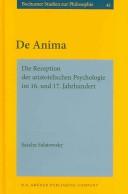| Listing 1 - 1 of 1 |
Sort by
|

ISSN: 1384668X ISBN: 9060323742 9789060323748 9786612156144 1282156144 9027293856 9789027293855 Year: 2006 Volume: 43 Publisher: Amsterdam Benjamins
Abstract | Keywords | Export | Availability | Bookmark
 Loading...
Loading...Choose an application
- Reference Manager
- EndNote
- RefWorks (Direct export to RefWorks)
Aristoteles' De Anima ist einer der zentralen Texte der Philosophiegeschichte. Seine grundlegende Leistung liegt in der alle Lebewesen umfassenden ontologisch-ontischen Bestimmung der Seele und ihrer Vermögen, einschließlich der Lehre vom Geist (nous), deren nähere Explikation seit der Antike Anlaß zu vielfältigen Diskussionen gab. Die vorliegende Studie ermittelt unter Rückgriff auf die traditionellen Schulen des Alexandrismus, Neuplatonismus, Averroismus und Thomismus diejenigen mannigfaltigen philosophischen und theologischen Konstellationen des 16. und 17. Jh.s, die von innerkatholischen wie interkonfessionellen Auseinandersetzungen zwischen Katholiken, Lutheranern und Calvinisten geprägt waren. Unter diesem Gesichtspunkt werden die entsprechenden Werke der Reformatoren Luther und Melanchthon, der Renaissance-Aristoteliker Portio, Toletus, Zabarella und die Conimbrincenser sowie die hier erstmals berücksichtigten Schriften der lutherischen und calvinistischen Schulphilosophen des 17. Jh.s. interpretiert.Aristotle's On the soul is one of the most important books in the history of philosophy. Its fundamental achievement is based on the ontological-ontical definition of the soul and its virtues, which embrace all living beings, including the doctrine of the mind (nous), and whose further explication has been interpreted controversially since antiquity. With respect to the traditional schools of Alexandrism, Neoplatonism, Averroism and Thomism the present study studies the various philosophical and theological constellations of the 16th and 17th century, which were determined by the intracatholical as well as by the interdenominational controversies between the Catholics, Lutherans and Calvinists. From this point of view the works of Luther and Melanchthon, of the Renaissance-Aristotelians Portio, Toletus, Zabarella, and the Conimbricenses as well as the works of the Lutheran and Calvinistic Philosophers of the 17th century are interpreted, these last ones being taken into consideration here for the first time. Then follow interpretations of some of the main philosophical concepts of Aristotle's De Anima in the 16th and 17th century, namely the Protestant Aristotelianism of Luther (1483-1546) and Melanchthon (1497-1560), the 'Second Scholastic' of the Jesuits Toletus (1532-1596) and Emmanul de Goes, the Natural Philosophy of Portio (1496-1554) and Zabarella (1533-1589) and at least the New Protestant Aristotelianism of Martini (1570-1649), Evenius (1585/9-1639), Scheibler (1589-1653), Leuschner (1589-1641) and Dannhauer (1603-1666) at the Lutheran Universities in Germany in the early 17th century.
Psychology. --- Aristotle. --- Behavioral sciences --- Mental philosophy --- Mind --- Psychologie --- Psychology --- Science [Mental ] --- Philosophy --- Early works to 1850 --- Philosophie --- Ouvrages avant 1850 --- Science, Mental --- Human biology --- Soul --- Mental health --- Aristotle --- Aristotle. - De anima.
| Listing 1 - 1 of 1 |
Sort by
|

 Search
Search Feedback
Feedback About UniCat
About UniCat  Help
Help News
News